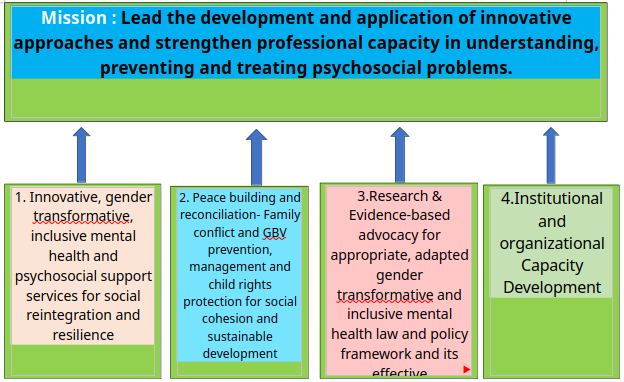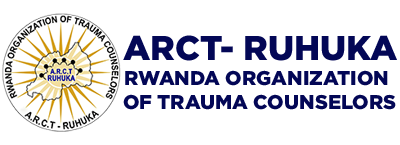ARCT-RUHUKA OVERVIEW
The Rwanda Organization of Trauma Counselors (ARCT-RUHUKA) is a national organization of professional Trauma Counselors that was formed in 1998 and officially registered as a non-governmental organization in 2004, under a ministerial decree no 97/11 of July 2007 and is legally registered by Rwanda Governance Board. The organization operates countrywide in the field of Mental Health and Psychosocial Support (MHPSS). peace and development. ARCT-Ruhuka has its Headquarters in Gasharu village, Kibagabaga cell, Gasabo district of Kigali city (KG 321 St), with 11 field offices in Gicumbi, Rulindo, Musanze , Rubavu, , Nyamasheke, Nyamagabe, Huye ,Nyanza, Ramonvi, Kavonza and Gatsibo districts.
VISION:
ARCT-Ruhuka envisions a Rwandan society where people are psychosocially healthy.
MISSION STATEMENT:
To lead the development and application of innovative approaches and strengthen professional capacity in understanding, preventing and treating psychosocial problems.
CORE VALUES:
- Non-discrimination
- Confidentiality
- Professionalism
- Commitment
- Transparency and
- Accountability
GUIDING PRINCIPLES:
- Upholding the highest ethical standards in all engagements
- Work collaboratively and accountability with strategic actors and partners
- Solidarity and collaboration with all in the quest for peace of social well-being and;
- Stewardship and resources entrusted to us.
OBJECTIVES:
- Increasing the number of professionals in trauma counseling (prevention, management and healing) through training or Technical Counselors and Psychosocial Community Workers / Community Facilitators or Mentors
- Maintaining professional standards of Counselors and psychosocial Community workers by offering regular clinical supervision support;
- Ensure permanent quality counseling services at different community levels
- To intervene in traumatic crisis situations
- Conducting research in order to highlight the influencing factors of psychological trauma and sensitizing people on prevention strategies,
- Collaborate nationally, regionally, and internationally with other institutions dealing with Mental Health, human development, Peace and resilience building
- Capacity building and support to other institutions intervening in psychosocial services

